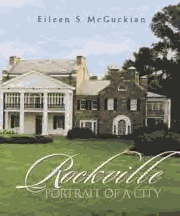
Rockville, Portrait of a City.
Hillsboro Press, Franklin, Tennessee, 2001.
Chapter 4, pp. 55-5.
© City of Rockville
Local Historian
Account
An account by local historian, Eileen McGuckian.
 |
McGuckian, Eileen S. Rockville, Portrait of a City. Hillsboro Press, Franklin, Tennessee, 2001. Chapter 4, pp. 55-5. © City of Rockville |
Emancipation and Reconstruction
Slaves in the border state of Maryland gained their freedom through a variety of opportunities between 1862 and 1864. in 1862, the U.S. Congress freed slaves who lived or worked in Washington D.C., qualifying slaveholders for compensation of the loss of human property if they owned land or slaves in Washington. The Beall sisters of Rockville manumitted seventeen slaves under this policy in 1862. Later that year, both Congress and President Lincoln proclaimed free the slaves of owners disloyal to the United States. Heartened, Maryland slaves more frequently slipped to freedom in the capital city.
Another route to freedom for black men was enlistment in the Union army. The use of black soldiers, authorized by mid-1862 although unpopular in middle-ground Maryland, was unavoidable by the following year. The War Department's General Orders No. 329, which established regulations for recruiting free blacks and slaves in the border states, eventually resulted in nearly nine thousand Maryland blacks serving in six U.S. regiments. Depending upon rules and attitudes at the time of their enlistments, Rockville slaves Reuben Hill, James Barber and William Preston and their owners may have been promised freedom and/or money for their military service.
By 1864, with an uncertain military and political climate, the authority of Maryland slaveholders had totally collapsed. All willing slaves, physically fit or not, were mustered in an attempt at full recruitment. The state authorized additional bounties for enlisting slaves of agreeable masters. On the political front, Unionists, former Whigs, Republicans, and others ready for statewide emancipation joined to elect a majority to the General Assembly. On October 3, 1863, Postmaster General Montgomery Blair spoke in Rockville to defend President Lincoln's policy of peaceful reunion of the country in opposition to extremists who would not accept the South as equals again. With the blessing of Governor Augustus W, Bradford, Unconditional Union delegates assembled in April 1864 to rewrite the state constitution. Soldiers voting in the field in October 1864 ensured passage of the document, although 73 percent of Montgomery County voters did not approve. It outlawed slavery in Maryland, effective November 1 of that year, and disenfranchised Southern sympathizers by requiring a strict loyalty oath. For a brief time, Reconstruction reigned in the state of Maryland.
Three years later, the pendulum swung back. A new General Assembly, a new governor, and a populace with a 250-year history of slavery convened to write a new Maryland constitution in 1867. Pro-Southern Democrats retained many elements fo the old order and re-enfranchised former Rebels. A legac of the new constitution was a census of slaves and owners, as of November 1, 1864, made in the unfulfilled hope that the federal government might compensate slaveholders in gratitude for Maryland's loyalty to the Union. Two powerful former antagonists, Willaim Veirs Bouic and Montgomery Blair, laid aside past differences to keep former secessionists on the Maryland voting rolls.
Newly freed blacks looked to the federal government for protection from physical attacks, legal abuse, and trhe reinstatement of prewar relationships. The Bureau of Refugees, Freedmen, and Abandoned Lands, popularly known as the Freedmen's Bureau, opened in Maryland in September 1865. Captain, later Colonel, R.G. Rutherford supervised Montgomery County's program from an office in Rockville. He adjudicated claims for collection of wages, taking some to trial in circuit court. He met with blacks interested in building school houses, attempted to connect freedmen with prospective employers, kept lists of black property owners, and intervened for parents whose hired-out children were not returned when promised. It is clear from the records that labor was much in demand in the postwar period, and that many verbal understandings turned into disagreements.
Three Rockville cases demonstrate the scope of the Freedmen's Bureau. When Mrs. Richard Johns Bowie found it difficult to fill the jobs of former slaves at Glenview, she wrote Captain Rutherford to request that he deliver a letter for her. Mrs. Bowie sought a "middle aged woman who would desire a good home--with liberal wages--A Cook, Washer & Ironer, of good character, coming well recommended--Many wish to hire in the Country--who do not like the City." in 1866, Daniel Brogdon and Solomon Williams, through the Freedmen's Bureau, accused J. Mortimer Kilgour of having left Rockville in 1861 to enter the rebel army, taking with him funds they had collected and entrusted to him in 1858 toward purchasing a church. The Bureau also represented freedman Hillary Powell, who was severely caned by Dr. A.H. Sommers for an impertinent reply. Rutherford obtained a cash settlement from Kilgour but could not convince a Maryland jury to indict the Rockville doctor.